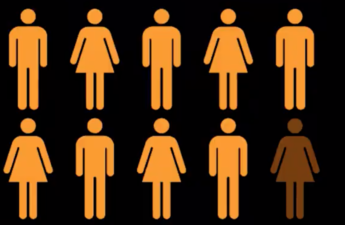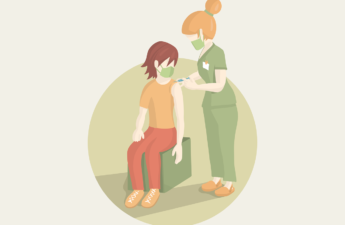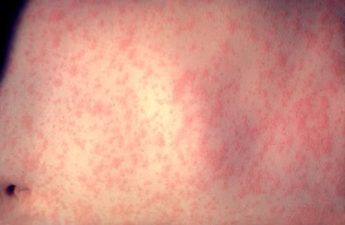By Allee Mead, Rural Health Information Hub
Amy Hille grew up in rural Ritzville, Washington. After a health and fitness career in California, she moved back home and became the library assistant at East Adams Library District.
After Hille was in this position for a few months, the library director asked her what type of programming she’d like to bring to the library.
Since I’d returned to our small town, I was seeing that there has been a consistent loss and continual loss of services, both health and social, in the time I had been gone, and I thought that was something that the library could address.
“Since I’d returned to our small town, I was seeing that there has been a consistent loss and continual loss of services, both health and social, in the time I had been gone,” Hille said, “and I thought that was something that the library could address.”
The community has a hospital — “We are still holding on to our rural hospital with a death grip,” Hille said — along with a health clinic and a Department of Health office, but the community is lacking in mental healthcare services and social services.
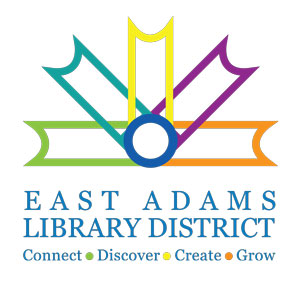
The library didn’t have any health programming at that time, so Hille connected with Michele Spatz, All of Us Community Engagement Coordinator at the Pacific Northwest region of the National Network of Libraries of Medicine (NNLM-PNR), which is funded by the National Library of Medicine.
Spatz helped her plan a National Prescription Drug Take Back Day program and told her about the NNLM-PNR grant that Hille then applied for and received.
“Through Michele’s support and guidance, we were able to get that grant and our health programming just kind of blossomed from there,” Hille said.
Across the country, rural libraries increasingly are offering community members more than books. They’re providing internet access, health literacy classes, and programs like walking groups. A 2017 American Library Association (ALA) paperstates that 39.8% of rural libraries (in surveys from 2011 and 2014) offered access to subscription health and wellness databases and 46% helped patrons identify health insurance resources.
Libraries aren’t just libraries anymore. Libraries are becoming community centers.
“Libraries aren’t just libraries anymore,” Hille said. “Libraries are becoming community centers.”
Presentations on Health-Related Topics
The largest component of East Adams Library District’s health programming is monthly health literacy programs, which feature speakers on a variety of health topics. The NNLM-PNR grant allows the library to give these speakers, especially those traveling across the state of Washington, a small travel stipend.
Topics for these monthly programs have included mental health, genetics, vaccinations, LGBTQ health awareness, and healthy aging.
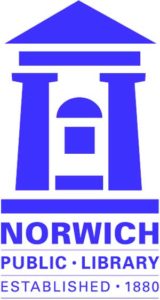
In rural Norwich, Vermont, Lisa Milchman is Assistant Director of Norwich Public Library. Milchman was a nurse before she earned a dual master’s degree in library science and health studies and became credentialed as a Consumer Health Information Specialist. She said, “So much of nursing besides bedside care is providing information to people, and it was just a different sort of information that I was providing, so once I kind of made that shift in my mind, I see them as two different facets of a public service.”
Before receiving the Public Library Association (PLA) Libraries Connecting You to Coverage grant, the Norwich Public Library had already been providing health information through displays and a workshop of how to find reliable information. The staff discussed bringing in programming about different types of literacies, like legal literacy and civic literacy, but the idea proved difficult to pull off. However, the PLA grant allowed them to address health literacy in their service area.
The Norwich library invited a representative from the Council on Aging to host a “Medicare boot camp” and a health insurance navigator to present information and help attendees sign up for insurance.
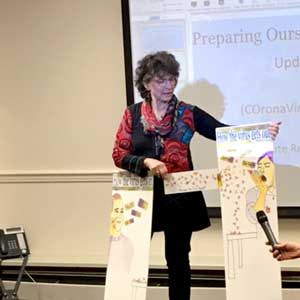
Milchman said that, in the first year of the grant, people didn’t think of their library as an organization that would put on events like this. By the second year, people were taking for granted that their library put on health programming, so the health insurance navigator’s second presentation had better attendance than in the first year.
Recently, Milchman has been displaying information sheets and signs about the coronavirus disease COVID-19 and invited an epidemiologist and a public health expert to speak about this health concern.
The Norwich Public Library website explains how the library is routinely cleaned and how patrons can access library resources from home. One patron thanked Milchman for her work and said she now looks to the library as a source of health information.
In addition, the Norwich library was able to use PLA funds to send the navigator to another library in its consortium to give the presentation.
“We’re fortunate to be in a better-resourced community,” Milchman said. “We feel some responsibility towards providing what we can within our small consortium to other libraries.”
Training Patrons and Library Staff in Health Literacy
Milchman found out that, when patrons asked for help finding health information, some library employees were using mainstream search engines instead of reliable sites like MedlinePlus, a National Library of Medicine website. She presented to the staff on how to find and evaluate health information.
The Norwich Public Library website has links to health information resources and health organizations across Vermont, and the library’s programming and publicity coordinator posts health resources and event information on social media.
In rural Hemingway, South Carolina, Marilynn Lance-Robb, branch manager of Carvers Bay Branch Library, originally received her NNLM grant in 2005 for her hair salon called MaFlo’s.
She had clients with diabetes who would ask her to look up health information for them, so she’d go to the library, print up information, and bring it back to the salon.
She decided it would be easier to have a computer at her business. In 2006, the REACH 2010 Charleston and Georgetown Diabetes Coalition’s Library Partnership had won the National Commission on Libraries and Information Science’s Health Information Award for Libraries. Lance-Robb asked one of the staff members if they thought she could apply for a NNLM grant for her salon. She was told, “Try and see.”
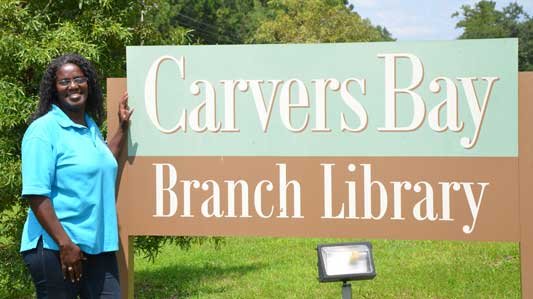
When her clients use the salon computer, Lance-Robb stresses that her clients use MedlinePlus so that they’re accessing reliable information. She added that MedlinePlus also describes different types of surgeries and procedures so people know what to expect. She herself used the website before her eye surgery and was better able to understand her doctor when he explained the procedure.
I always tell clients and patrons, ‘I’m not a doctor, so make sure you follow up with your physician, because we only give information and that’s it.’ Health information, that’s all we do.
“I always tell clients and patrons, ‘I’m not a doctor, so make sure you follow up with your physician, because we only give information and that’s it.’ Health information, that’s all we do,” Lance-Robb said.
She wanted to teach a computer class to her clients but only had one computer in her salon, so she partnered with the Carvers Bay Branch Library to use the computers there. This partnership continued for two or three years, Lance-Robb said. She continues to serve as library branch manager and operates her salon on an appointment-only basis.
Lance-Robb also taught computer skills at churches, health organizations, senior centers, and other community locations and brings MedlinePlus into summer reading programs for children. She distributes copies of the MedlinePlus Magazine to the four libraries and presents information about MedlinePlus at health fairs.
Providing Services Beyond Health Information
In addition to health information programming and computer training, these libraries offer other services to improve their communities’ health. For example, the Carvers Bay Branch Library in South Carolina offers a free summer lunch program and a kids’ café with afterschool snacks.
Along with training library staff to improve their ability to help patrons with health questions, Hille in Washington is working on rebuilding the library’s physical collection of medical and health information. She’s also setting up a computer kiosk where community members can access health and insurance information as well as learn about and enroll in social service programs.
Hille said that health providers and community organizations are excited for the upcoming kiosk because it’s another resource for people when, for example, the social worker won’t be in town this week but the client can still go to the library and use the kiosk to sign up for housing assistance.
After the PLA grant, Milchman in Vermont used some of the money to build up her library’s physical collection, especially information on health insurance, and to create print and social media ads about the library and its health-related information services.
Other Projects Across the Country
Telehealth for Veterans
The Foundation for Rural Service created a grant program to design Virtual Living Rooms℠ where veterans can access VA services via telehealth in locations like libraries, churches, and community centers. The first Virtual Living Room was created at the Jackson County Public Library in McKee, Kentucky.
Exercise Programs and Naloxone
A September 2019 Stateline article features libraries in rural Kentucky and Vermont. The Pulaski County Public Library in Somerset, Kentucky, offers nutrition workshops, walking groups, and health fairs.
The Kimball Public Library in Randolph, Vermont, partnered with a behavioral health program to screen a documentary about heroin and have a community conversation about substance use disorder.
Social Work Students
A pilot program with the South Carolina Office of Rural Health, University of South Carolina College of Social Work, and the Union County Carnegie Library brings a social work student to the rural library twice a week. Along with connecting community members to housing or job assistance, the student can also provide donated items like clothing, gift cards, and canned goods.
The pilot program is funded through a BlueCross BlueShield of South Carolina Foundation grant.
Fresh Produce at the Local Library
The Southern Adirondack Library System (SALS) and the Comfort Food Community food pantry in eastern New York created the Farm-2-Library program to help community members access fresh produce and cut down on food waste at local farms.
Volunteers travel to 23 participating farms and glean excess fruits and vegetables that the farmers can’t sell. The food pantry washes the produce and delivers it once or twice a week to four participating libraries: Argyle Free Library, Pember Library & Museum, Schuylerville Public Library, and Whitehall Free Library. The libraries display the produce, either in glass-front coolers or in baskets on top of bookshelves, and community members — regardless of income status — can take the food home. In addition, SALS partners with Cornell Cooperative Extension to provide cooking classes at these libraries.
The libraries provided over 2,500 pounds of food in the summer of 2018. In 2019, 3,068 pounds of food reached 827 people.
Well-Attended Programs and Well-Informed Patrons
These libraries are seeing success from these programs, both in numbers and individual responses. The Carvers Bay Branch Library in South Carolina has provided a total of 330 health- or computer-related sessions and demonstrations, with 4,346 people in attendance, since 2005.
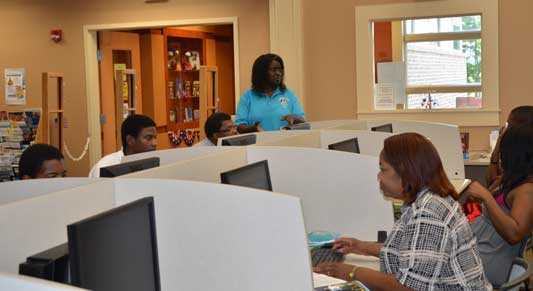
At East Adams Library District, one of the most successful programs focused on Medicare enrollment. One month, a group from the Washington State Office of the Insurance Commissioner gave a comprehensive presentation about Medicare.
The next month’s program was an open enrollment event for community members signing up, making any changes to their current plans, or wanting to learn more information. Hille said that at the time of the event there was a line of people ready to participate.
She added, “I’m not of Medicare eligibility age. I only kind of know the struggles that my parents have had or we were dealing with, with my grandmother’s care, and that it’s confusing, it’s challenging, and it gets really frustrating for people, especially when they’re not that technologically savvy.”
Hille met attendees living off their Social Security checks who were able to sign up for assistance programs through the event and veterans who learned at the event that they may qualify for healthcare coverage through the VA. The volunteer who put on the enrollment event told Hille it was one of the most successful enrollment events she’s participated in, especially considering the community’s small size.
Overall, Hille reported that community members are “really happy that this programming is in place” and are giving suggestions for future topics.
At the Norwich Public Library in Vermont, the Medicare boot camp and health insurance navigator presentations are also well-attended. One man told Milchman that he feels lost on health insurance websites, so he appreciated meeting with someone who could help him understand that information. Even a library staff member who was moving on to a different job needed help navigating insurance options.
It almost made me teary to think that our workshop could have that impact on a person’s life.
She also remembers the look of relief on one woman’s face when she found out that she might be able to significantly lower her current health insurance payments of $600 per month. “It almost made me teary to think that our workshop could have that impact on a person’s life,” Milchman said.
Challenges and Lessons Learned
Hille in Washington said that it can be hard scheduling library events around community happenings like high school sporting events: “Part of our struggle with the programming is: How can we provide these services at time periods that people are able to attend and how can we figure out the programming that is really going to catch their eye?”
Another challenge in her community is limited budgets. She added, “In rural areas that’s everybody’s struggle. The fact that we’re all staying afloat and operating is already a success.” It can be difficult to partner with other organizations that are interested but understaffed.
“So I’ve kind of had to reframe my reference point or how I was looking at it, and I started approaching it as: How can the library do the brunt of the work so that our community members can get the benefits?” Hille said.
Hille sees the local hospital as a promising potential partner. The library and the hospital have an existing relationship through their mutual participation in community health coalitions, which discuss upcoming projects and ways to collaborate. The library participated in the hospital’s annual health fair last fall and the two organizations are exploring partnering on a women’s health project this spring.
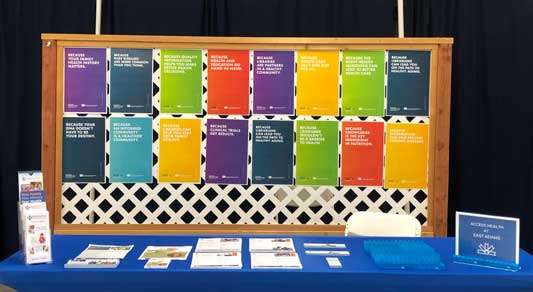
Lance-Robb recommended libraries become an NNLM network member, and Hille recommended connecting with your NNLM region not only for potential funding opportunities but also for support and resources.
Hille advised other libraries to look for the small ways they can help their community. For example, if a local healthcare facility has a health fair, libraries can ask to exhibit, even if all they have to offer at the moment is internet access for people to look up health information. “If you see a need, address it,” Hille said, however small the gesture.
For example, to start addressing homelessness in the community, the director at Hille’s library put a basket in the public restroom where people can donate toiletries like travel-sized shampoo and conditioner bottles and anyone can take whatever items they need, no questions asked. The library is also working on partnering with the laundromat to offer free wash-and-dry cycles and packets of laundry soap for community members in need.
“In a small library,” Milchman in Vermont said, “you have a lot of latitude to pursue things that you find personally meaningful.”
About Allee Mead
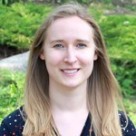
Allee Mead is a web writer for the Rural Health Information Hub. She has written on important rural issues, including maternal mortality and farmers’ mental health, and has presented nationally on RHIhub’s opioid resources. Originally from rural North Dakota, she has a master’s degree in English and is currently a doctoral student. Full Biography,
The Rural Health Information Hub, formerly the Rural Assistance Center, is funded by the Federal Office of Rural Health Policy to be a national clearinghouse on rural health issues.
